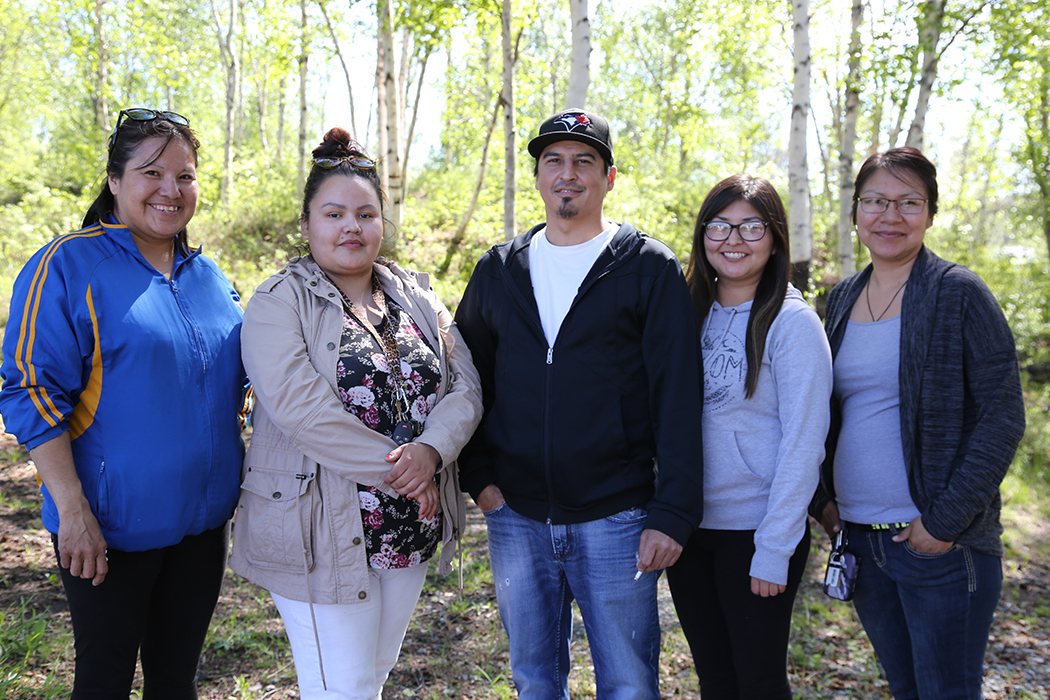Geoscience Field Assistant
Learn skills to support the exploration sector
Schools:
Program length: 5 Weeks
Start date: Check with Registrar
Credential:
- Aurora College Record of Achievement
Delivery:
- Classroom
- Field-based Training

Program Description
The five-week (150-hour) Geoscience Field Assistant training program was developed to provide participants with the skills and knowledge required to function as productive field assistants in the geoscience and mineral exploration sectors.
The program includes core courses that focus on technical skills required of field assistants, as well as safety-oriented modules necessary for those working in remote camp settings. Courses include: Introduction to the Role of a Geoscience Field Assistant; Communications and Team Work; Introduction to Orienteering; Applied Computer and Technology Skills; Basic Geology; Sampling; Prospecting; Claim Staking and Mineral Tenure; Geophysical Surveying and Grids; Introduction to Mineral Exploration; Wilderness Safety and Survival; Fixed Wing and Rotary Aircraft Safety; Field Camp Skills; Problem Solving and Decision Making; and Document Use and Data Entry.
The program also has a selection of additional courses so that the delivery can be tailored to the needs of specific industry and/or community clients.
Program Eligibility
Applicants must be:
- 18 years of age or older
- Operating at a Grade 9 level of reading, writing and mathematics
NOTE: Experience working in remote locations in a camp environment is an asset
Applicant Assessment
The applicants must submit documents demonstrating that they meet the eligibility requirements above. In addition, applicants should be aware that employers will generally be seeking field assistants who are:
- In good physical condition
- Comfortable with working on the land
- Prepared to deal with being away from home for extended periods of time
- Self-reliant
Applicants may be required to complete an assessment test.
Program Admission
Applicants will be admitted to the program based upon program eligibility and applicant assessment results.
Program Information
The program is based on 25 days with six hours per day, for a total of five weeks. The duration can be compressed to four weeks by training six days per week.
Delivery of components of this program at a geoscience field camp or exploration site is strongly encouraged, if a supportive company is able to accommodate a visit, and if sufficient funds are available for transportation of students and supplies. For example, the core courses 038-107 Prospecting, 038-113 Wilderness Safety and Survival, and 038-115 Field Camp Skills might all be covered in a six-or seven-day visit. The total duration of the program should not change if core components are delivered at a camp.
Program Objectives
To provide participants will the skills and knowledge required to be safe and productive geoscience and/or mineral exploration field assistants, who will:
- Acquire the knowledge, skills and attitudes required of Geoscience Field Assistants including the roles and responsibilities of employers, project managers and Geoscience Field Assistants and associated working conditions, places and types of work;
- Establish effective teamwork skills including the principles and practices of communication, teamwork, conflict resolution, traditional knowledge sensitivities, problem solving and decision making;
- Understand the basics of land navigation including traditional and historic techniques, the interpretation of topographic maps, use of the magnetic compass, and use of Global Positioning System (GPS);
- Establish basic knowledge and skills required to operate computers, digital cameras, handheld radios, SPOT (Système Pour l’Observation de la Terre) satellite messengers and satellite phones.
- Understand basic geological concepts and principles including the importance of the field of geology, uses of the Geological Map of Canada, and the basic geology of the NWT;
- Understand the processes and reasons for gathering geoscience samples including the common types of samples gathered, the purpose for gathering each type of sample, and common sampling methods;
- Understand prospecting in the NWT including the purpose and history of prospecting, the importance of prospecting to the exploration process, and the common types of mineral exploration in the NWT;
- Understand claim staking and mineral rights in the NWT including mineral tenure, obtaining a prospector’s licence, staking a claim, and the primary and basic differences between mineral exploration and oil and gas exploration rights;
- Understand the reasons and processes for conducting surveys and creating grids and grid lines including the purpose of surveying and common surveying methods;
- Understand the phases and life cycles of mineral exploration programs and mining operations.
- Establish effective practices to document and interpret day-to-day information typically encountered in the field;
- Understand safety procedures and practices including Wilderness First Aid (First Aid, CPR-A, Basic Wilderness Survival), Bear Safety, basic passenger safety procedures when operating in or around fixed wing and rotary aircraft, and Personal Protective Equipment (PPE);
- Develop the knowledge and skills to set up and maintain a functional field camp including planning, logistics and operations, required camp equipment, food handling and storage, waste and garbage storage and removal, and fuel handling;
Completion Requirements
Participants must complete all core courses in order to complete the program.
Document of Recognition
Aurora College Record of Achievement
Courses
- 038-104 | Applied Computer and Technology Skills
- 038-105 | Basic Geology
- 038-108 | Claim Staking and Mineral Tenure
- 038-102 | Communication and Team Work
- 038-112 | Document Use and Data Entry
- 038-115 | Field Camp Skills
- 038-114 | Fixed Wing and Rotary Aircraft Safety
- 038-109 | Geophysical Surveying and Grids
- 038-110 | Introduction to Mineral Exploration
- 038-103 | Introduction to Orienteering
- 038-101 | Introduction to the Role of a Geoscience Field Assistant
- 038-111 | Problem Solving and Decision Making
- 038-107 | Prospecting
- 038-106 | Sampling
- 038-113 | Wilderness Safety and Survival
How to apply
Participants must be registered with the Mine Training Society of the NWT to be considered for Aurora College Mining Programs.
For more information about the above visit:
